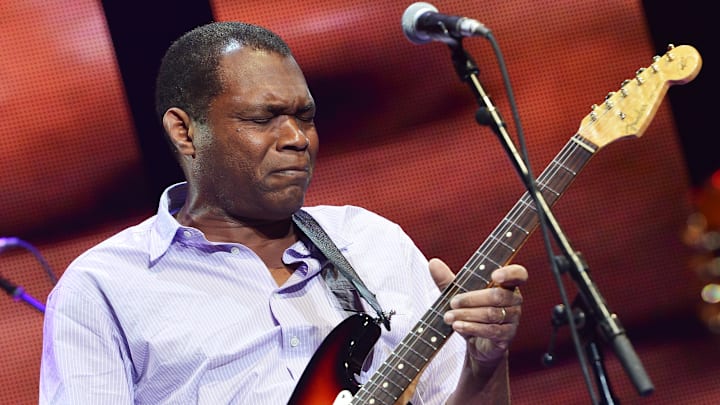Here's an interesting bit of recent music history: Robert Cray, the renowned guitarist and seemingly former friend of Eric Clapton, once revealed his decision to sever ties with the iconic musician. Cray's rift with Clapton stemmed from their divergent views on COVID-19 lockdowns and vaccines, which Cray found to be extreme and selfish.
In a candid essay published in The Washington Post, Cray recounted his initial attempt to understand Clapton's controversial stance. The catalyst was Clapton's song "Stand And Deliver," from the album The Lady in the Balcony: Lockdown Sessions, where lyrics likening lockdowns to slavery struck a dissonant chord with Cray, especially considering his own background as a black man raised in segregated Georgia.
Upon expressing his concerns to Clapton, Cray found the guitarist's defense of the lyrics — attributing them to some vague historical context — unsatisfactory. Cray further juxtaposed a past photograph of himself, Clapton, and other musicians with a recent one featuring Clapton alongside Texas Governor Greg Abbott, questioning the shift in Clapton's associations, and he asked himself "[W]hat’s wrong with this picture? Why are you doing this?"
This wasn't the first controversy from Eric Clapton
The article delves into Clapton's previous descent into conspiratorial beliefs, which have alienated him from friends and family, as well as fans, including his infamous 1976 onstage remarks about immigration, where he even went so far as to echo the undeniably racist slogan, "Keep Britain white" (extra ironic to many, given Clapton's blues collaborations and his famous cover of Bob Marley's "I Shot the Sherriff"). Clapton's reticence to engage with the press after his anti-lockdown comments, as evidenced by his manager's response, reflects his defensive stance amid ongoing scrutiny.
Obviously, rock and roll music (or, let's face it, softer rock, in this case) is a place where controversy easily finds a home. Still, if things get controversial enough, it stops being a happy home, and a band starts looking too much like a dysfunctional family. On that note, Cray's decision to distance himself from Clapton ultimately boils down to a realignment of values. Rejecting extremism and selfishness, Cray emphasizes his commitment to his music and principles, independent of association with figures like Clapton.
Ironically, despite anti-vaccine individuals and far-right figures depicting themselves as courageous, valiant "lone wolf" types, sometimes it's the pro-vaccination people — or liberals and people decidedly more on the left — who make painful decisions to separate themselves from people they used to support, or previously thought they knew. Cray's story is just one of a countless array of such stories. Eric Clapton is still a respected and influential musician, and even nom-fans might have a tough time trash-talking a song as emotionally potent as "Tears in Heaven." Still, some character arcs are deeply troubling and/or embarrassing, and the road to redemption can sometimes be rocky, if not a dead end altogether.
